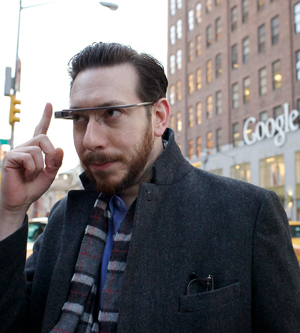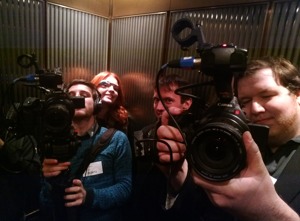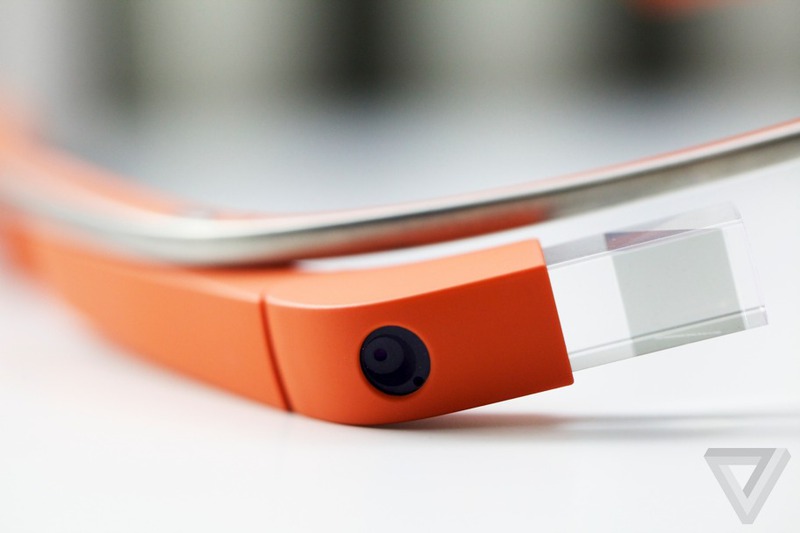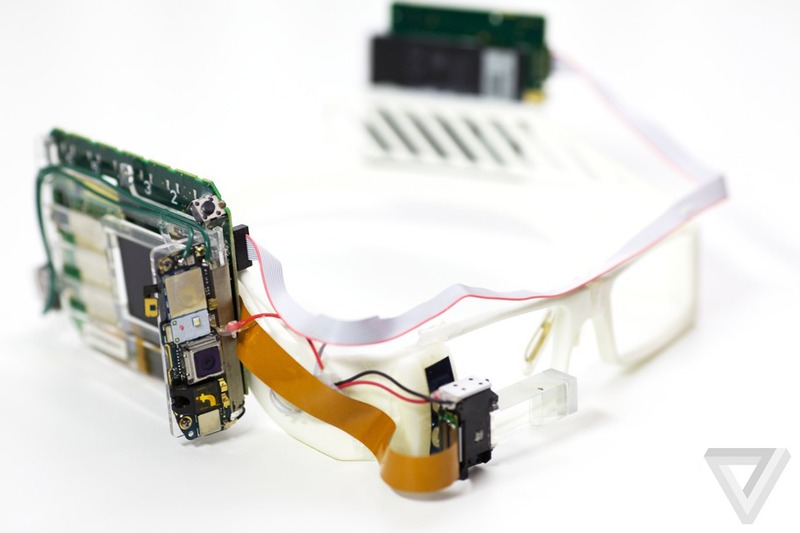How I used Google Glass: the future, but with monthly updates (part 2)
The previous post was removed in drafts, because I forgot to arrange it as a translation. Sorry for the inconvenience.
First part

Finally, I had a chance to put on a device to feel for myself what it was like to use glasses. This moment I waited all day. And now he has come.
')
By activating Points, you should notice a small screen that hovers in the upper right corner of your field of view, but I don’t see it completely. Instead, I see the ghost of its upper part, and the lower one generally went somewhere abroad.
Steve and Isabelle nasal fix, and finally I see a glowing square. Victory.
It takes some time to get used to the screen soaring in front of you, and this is especially unusual, when it appears and then disappears, you want to call it again, but do not know how. Fortunately, this happened to me only once.
And here is what you see: the watch, below it is a short text - “ok glass”. So you can activate Points by voice. In fact, this process consists of 2 steps. First you need to touch the eyeglasses (which are actually sensory) or slowly tilt your head back - a gesture that wakes up the Points. Once you have done this, you can execute commands by saying “ok glass”, and then select the desired action, scrolling your finger along the points arm. You can do this by moving your finger forward or backward along the strip, choose — by touch, return — by sliding your finger from top to bottom. However, the main interaction is carried out by voice.
The device can receive data using the built-in Wi-Fi module or Bluetooth, connecting to your Android device or iPhone in order to use its 3G or 4G connection. The glasses themselves do not have a cellular module, but there is a GPS.
To begin with, its use almost completely coincides with what the company showed in the latest commercial. There are no special effects - that's how Points are used. Simple, elegant, without interfering with the review. The screen is unobtrusive, it does not distract you. Here he was just now - and now he is gone. He is not shocking. Not shaking. This is just a new object in your field of view. And this is very cool.


Photos taken by Google Glass
Points do all sorts of things after you say "ok glass". All those things that you would like to do with the camera on your face. "Take a picture" - takes a photo. “Record a video” - records a ten-second video. If you need more - just touch the handle. Say "ok glass, Google" and a search engine will appear, integrated into something resembling Google Now and Knowledge Graph. Basically, when you ask the Points questions, you get an answer in the form of stylized cards with information - like in Google Now on Android.
Search in natural language works in most cases. But when not, it is discouraging, leaving you with a completely useless result. Also, the Points do not always understand you correctly or the tempo of speech expected from you does not coincide with the real one. I struggled with the Points with all these, giving voice commands that the device did not seem to have time to interpret. If I managed to give them "correctly", Points usually reacted quickly, giving the necessary information and entering the desired state.
The reason for some problems is the banal lack of communication. Having a good channel is obviously a prerequisite for the normal functioning of the device. When you take Points for a walk, the loss of a signal or an excessively slow connection makes the device almost useless.
Steve and Isabelle know that things are not going smoothly. In fact, they told me that the team is planning to release monthly updates for the devices when Explorer explodes. There is still a lot of work ahead.
But the most interesting part for most people is not search functionality, at least not in our usual form. Yes, Points can tell how old Brad Pitt is (49, for those who keep score), but Google is more interested in providing you with the information you need at this particular moment. Do you want the weather? You are welcome. Interested in how you get to the right place? That they, too, can, and in real time, from turn to turn. Want to share your experiences with someone on Google Hangout? Yes, it is also possible.

But the thing that everyone is going crazy about, and which you probably would like to see, is the ability to take photos and video from the “first person”. I’m not lying if I say that it is surprisingly convenient (and a little scary) to be able to start recording or take a photo with a couple of strokes with your fingers or a simple voice command.
During my testing of Points, we decided to make a route to the nearest Starbucks - the film crew also went with us. As soon as we went inside, the workers asked to stop filming. Sure, no problem. But Points continued to record all the time while I was making the order. Of course, you can notice a light in the prism, when the device records, but it seemed to me that most people have no idea what is in front of them. The cashier, it seems, did not dare to ask me what it was wearing on my face, but did not ask. And he certainly didn't ask me to stop recording.
As soon as Explorer versions spread around the world, there will likely be a lot of abuse in this area. Perhaps “abuse” is the right word. Steve says that one of the tasks of the Explorer program is to understand how people want (and will) use Points. “This is very important,” he says, “what we are trying to do is expand the circle of Points users. He currently consists of our team and several other people from Google who are testing them. We want to expand this group beyond Google. We believe that this is really important for the development of Points, because this is a whole new product, and not just some kind of software. We want to understand how it fits into the lives of people. " That is his opinion. “This is a very personal device. We would like to better understand how other people are going to use it. We think that this is a great opportunity for them to influence the future of Points not only by giving us feedback on the product, but also by helping to develop social norms. ”
I asked them if this was their attempt to define some kind of "etiquette of using points." Will there be an analogue of retweets for Points? “That’s what Explorer is for,” says Steve. But she will not answer the question of what is right to do and what is not with a camera that does not need to be held to take a photo and is often invisible to others. Will people feel comfortable thinking about this? What are they going to do about it?
Privacy will be a big obstacle for Google with Points. Just as big as the need to convince ordinary people to wear something alien and not fashionable than Points are at the moment.

But still, what is it like wearing glasses? Use them while walking? This is awesome!
Imagine this: you received a message or call while you were walking along a busy street, in this situation you need to do 2 or 3 things. Most of them require a complete distraction from what you are doing now. With Glasses, this information simply appears in front of you, in your field of vision, awaiting your action. And these actions - just to touch the shackle or lift your head - nothing that can distract you from the main occupation - maneuvering between people.
This is a simple concept that is very powerful in practice.
Same thing with navigation. When I arrive in New York, I have to constantly open Google Maps to understand where I am. Even after a decade in the city, it seems to me that I can never find the right turn to exit the subway. You still need to strain, asking Points to pave the route, but the disappearance of the barrier as an annoying device in the hands matters, and the display of routes in real time is even more so. In the city, Points allow you to feel more powerful, equipped and less distracted.
Admittedly, wearing glasses caused me to feel awkward, or maybe it was just my paranoia (or the fact that I looked like a big freak), but I felt that people were staring at me. Everyone with whom I met my eyes seemed to be saying, “Hey, what is this garbage?”, And this caused a feeling of awkwardness.
Steve argues that when such questions are asked, people become interested in Glasses. “We carried them in public for almost a year and it was very interesting and exciting. At first, we were pleased and confident in the design, but you never know for sure until you start wearing them everywhere. Of course, my friends make fun of me: "no girl now speaks to you, they think you're strange." But exactly the opposite is happening. ”
I do not think that Points would be appropriate in any situation. It’s easy to imagine how great it is for parents to shoot all these amazing things their children do, or skydivers and climbers who want to capture their experience, despite their busy hands. And they are likely to be useful in Thailand to get directions or translate something - but they may be out of place at a dinner party, or on a date, or while watching a movie. In fact, they can make these situations awkward and even lead to unpleasant consequences.
Sometimes you want an old-fashioned distraction. And sometimes you want people to see you, not a device on your face. Which, perhaps, removes you right now, and can and does not remove.
This brings me back to the original question: who wants to wear this in public?

Truth be told, I was starting to love Glasses when I was wearing them. They are quite comfortable and bring something new to your horizons (in the literal and figurative sense), which is of great importance and potential. I do not think that my face looks quite right without my usual glasses, and I also do not think that it looks right with Glasses, but after a while I began to feel this “irregularity” less and less. Already something, isn't it?
Eyeglass lenses supplied with the device must go a long way to make the glasses familiar. Working with someone like Ray-Ban or Warby Parker will help them with this. It is possible to understand now, using them and feeling what it feels like, to walk in Glasses in public; how comfortable you can be with this device.
They really are for everyone? Not really. Does the team need to go a long way to make them suitable for daily use? Definitely.
But I was leaving with the conviction that this was not just another gossip of Google. The more I used Points, the more they made sense to me, the more I wanted them. If the team offered me to sign up to have my current points, but supplemented with Points technology, I would sign and give money at the same time. And this is the important thing that determines the niche of devices - for geeks, or everyone wants to have it.
After several hours with Glasses, I decided that the main question was no longer “if?”, But “when?”.
First part
Topolsky in the looking glass

Finally, I had a chance to put on a device to feel for myself what it was like to use glasses. This moment I waited all day. And now he has come.
')
By activating Points, you should notice a small screen that hovers in the upper right corner of your field of view, but I don’t see it completely. Instead, I see the ghost of its upper part, and the lower one generally went somewhere abroad.
Steve and Isabelle nasal fix, and finally I see a glowing square. Victory.
It takes some time to get used to the screen soaring in front of you, and this is especially unusual, when it appears and then disappears, you want to call it again, but do not know how. Fortunately, this happened to me only once.
And here is what you see: the watch, below it is a short text - “ok glass”. So you can activate Points by voice. In fact, this process consists of 2 steps. First you need to touch the eyeglasses (which are actually sensory) or slowly tilt your head back - a gesture that wakes up the Points. Once you have done this, you can execute commands by saying “ok glass”, and then select the desired action, scrolling your finger along the points arm. You can do this by moving your finger forward or backward along the strip, choose — by touch, return — by sliding your finger from top to bottom. However, the main interaction is carried out by voice.
The device can receive data using the built-in Wi-Fi module or Bluetooth, connecting to your Android device or iPhone in order to use its 3G or 4G connection. The glasses themselves do not have a cellular module, but there is a GPS.
To begin with, its use almost completely coincides with what the company showed in the latest commercial. There are no special effects - that's how Points are used. Simple, elegant, without interfering with the review. The screen is unobtrusive, it does not distract you. Here he was just now - and now he is gone. He is not shocking. Not shaking. This is just a new object in your field of view. And this is very cool.


Photos taken by Google Glass
Points do all sorts of things after you say "ok glass". All those things that you would like to do with the camera on your face. "Take a picture" - takes a photo. “Record a video” - records a ten-second video. If you need more - just touch the handle. Say "ok glass, Google" and a search engine will appear, integrated into something resembling Google Now and Knowledge Graph. Basically, when you ask the Points questions, you get an answer in the form of stylized cards with information - like in Google Now on Android.
Search in natural language works in most cases. But when not, it is discouraging, leaving you with a completely useless result. Also, the Points do not always understand you correctly or the tempo of speech expected from you does not coincide with the real one. I struggled with the Points with all these, giving voice commands that the device did not seem to have time to interpret. If I managed to give them "correctly", Points usually reacted quickly, giving the necessary information and entering the desired state.
The reason for some problems is the banal lack of communication. Having a good channel is obviously a prerequisite for the normal functioning of the device. When you take Points for a walk, the loss of a signal or an excessively slow connection makes the device almost useless.
Steve and Isabelle know that things are not going smoothly. In fact, they told me that the team is planning to release monthly updates for the devices when Explorer explodes. There is still a lot of work ahead.
But the most interesting part for most people is not search functionality, at least not in our usual form. Yes, Points can tell how old Brad Pitt is (49, for those who keep score), but Google is more interested in providing you with the information you need at this particular moment. Do you want the weather? You are welcome. Interested in how you get to the right place? That they, too, can, and in real time, from turn to turn. Want to share your experiences with someone on Google Hangout? Yes, it is also possible.

But the thing that everyone is going crazy about, and which you probably would like to see, is the ability to take photos and video from the “first person”. I’m not lying if I say that it is surprisingly convenient (and a little scary) to be able to start recording or take a photo with a couple of strokes with your fingers or a simple voice command.
During my testing of Points, we decided to make a route to the nearest Starbucks - the film crew also went with us. As soon as we went inside, the workers asked to stop filming. Sure, no problem. But Points continued to record all the time while I was making the order. Of course, you can notice a light in the prism, when the device records, but it seemed to me that most people have no idea what is in front of them. The cashier, it seems, did not dare to ask me what it was wearing on my face, but did not ask. And he certainly didn't ask me to stop recording.
As soon as Explorer versions spread around the world, there will likely be a lot of abuse in this area. Perhaps “abuse” is the right word. Steve says that one of the tasks of the Explorer program is to understand how people want (and will) use Points. “This is very important,” he says, “what we are trying to do is expand the circle of Points users. He currently consists of our team and several other people from Google who are testing them. We want to expand this group beyond Google. We believe that this is really important for the development of Points, because this is a whole new product, and not just some kind of software. We want to understand how it fits into the lives of people. " That is his opinion. “This is a very personal device. We would like to better understand how other people are going to use it. We think that this is a great opportunity for them to influence the future of Points not only by giving us feedback on the product, but also by helping to develop social norms. ”
I asked them if this was their attempt to define some kind of "etiquette of using points." Will there be an analogue of retweets for Points? “That’s what Explorer is for,” says Steve. But she will not answer the question of what is right to do and what is not with a camera that does not need to be held to take a photo and is often invisible to others. Will people feel comfortable thinking about this? What are they going to do about it?
Privacy will be a big obstacle for Google with Points. Just as big as the need to convince ordinary people to wear something alien and not fashionable than Points are at the moment.

But still, what is it like wearing glasses? Use them while walking? This is awesome!
Imagine this: you received a message or call while you were walking along a busy street, in this situation you need to do 2 or 3 things. Most of them require a complete distraction from what you are doing now. With Glasses, this information simply appears in front of you, in your field of vision, awaiting your action. And these actions - just to touch the shackle or lift your head - nothing that can distract you from the main occupation - maneuvering between people.
This is a simple concept that is very powerful in practice.
Same thing with navigation. When I arrive in New York, I have to constantly open Google Maps to understand where I am. Even after a decade in the city, it seems to me that I can never find the right turn to exit the subway. You still need to strain, asking Points to pave the route, but the disappearance of the barrier as an annoying device in the hands matters, and the display of routes in real time is even more so. In the city, Points allow you to feel more powerful, equipped and less distracted.
Admittedly, wearing glasses caused me to feel awkward, or maybe it was just my paranoia (or the fact that I looked like a big freak), but I felt that people were staring at me. Everyone with whom I met my eyes seemed to be saying, “Hey, what is this garbage?”, And this caused a feeling of awkwardness.
Steve argues that when such questions are asked, people become interested in Glasses. “We carried them in public for almost a year and it was very interesting and exciting. At first, we were pleased and confident in the design, but you never know for sure until you start wearing them everywhere. Of course, my friends make fun of me: "no girl now speaks to you, they think you're strange." But exactly the opposite is happening. ”
I do not think that Points would be appropriate in any situation. It’s easy to imagine how great it is for parents to shoot all these amazing things their children do, or skydivers and climbers who want to capture their experience, despite their busy hands. And they are likely to be useful in Thailand to get directions or translate something - but they may be out of place at a dinner party, or on a date, or while watching a movie. In fact, they can make these situations awkward and even lead to unpleasant consequences.
Sometimes you want an old-fashioned distraction. And sometimes you want people to see you, not a device on your face. Which, perhaps, removes you right now, and can and does not remove.
This brings me back to the original question: who wants to wear this in public?

Not if, but when
Truth be told, I was starting to love Glasses when I was wearing them. They are quite comfortable and bring something new to your horizons (in the literal and figurative sense), which is of great importance and potential. I do not think that my face looks quite right without my usual glasses, and I also do not think that it looks right with Glasses, but after a while I began to feel this “irregularity” less and less. Already something, isn't it?
Eyeglass lenses supplied with the device must go a long way to make the glasses familiar. Working with someone like Ray-Ban or Warby Parker will help them with this. It is possible to understand now, using them and feeling what it feels like, to walk in Glasses in public; how comfortable you can be with this device.
They really are for everyone? Not really. Does the team need to go a long way to make them suitable for daily use? Definitely.
But I was leaving with the conviction that this was not just another gossip of Google. The more I used Points, the more they made sense to me, the more I wanted them. If the team offered me to sign up to have my current points, but supplemented with Points technology, I would sign and give money at the same time. And this is the important thing that determines the niche of devices - for geeks, or everyone wants to have it.
After several hours with Glasses, I decided that the main question was no longer “if?”, But “when?”.
Source: https://habr.com/ru/post/173163/
All Articles